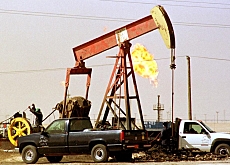
Hunt resumes for oil and gas in Switzerland

A joint Swiss-British venture has been awarded three exploration permits to assess oil and gas reserves at three sites in western Switzerland.
But the country’s oil and gas associations have cast doubt on the exercise, saying the country’s deposits are too insignificant to ever be economically viable.
London-based Ascent Resources and Swiss Petroleum are targeting previously undeveloped oil and gas discoveries in the western part of the Molasse Basin.
Two of the permit areas – one near Thun and the other near Frienisberg – are known to contain gas. The discoveries were made more than 20 years ago in wells originally drilled for oil exploration by Elf Aquitaine.
The pair will also assess an oil discovery situated between Yverdon and Lausanne, which was made by BEB (ExxonMobil and Shell) in 1962.
Ascent Resources, which has a 90-per-cent stake in the joint venture, says it initially plans to reprocess seismic data from the areas and conduct a new programme of geological studies.
“From early work by oil companies, positive data has been accumulated. Ascent is analysing this data and will do further surveys to quantify what’s really there,” Hugo de Salis, spokesman for Ascent, told swissinfo.
“Then we will make an economic decision on whether it’s right to progress each project on a case by case basis.”
“The company does believe that there is gas and oil potential there – no doubt about it,” he added. “There have been discoveries in the past, and although no other exploration has been undertaken we believe there is potential for life in the exploration areas.”
Oil and gas
De Salis said that while Switzerland might not be the first country that springs to mind in terms of oil and gas reserves, there were sizeable hydrocarbon deposits stretching right across Europe.
He said Ascent was active in northern Italy’s Po valley, the Netherlands, Hungary and Spain, where there are significant gas reserves.
“I think people have this impression that just because there are mountains [in Switzerland] there is no gas or oil,” he said. “But it does get locked in and you get reservoirs within those regions, such as the Molasse Basin where we’re looking at the moment.”
Patrick Lahusen, vice-director of Swiss Petroleum, is also confident that the venture will prove successful.
In a recent interview with the newspaper 24 Heures, he said scientific and technological advances meant that new oil and gas discoveries in Switzerland were now possible.
“Modern technology allows us to spot things that couldn’t be seen before,” said Lahusen.
Question mark
But if the joint British-Swiss venture strikes black gold, it will come as a surprise to Rolf Hartl, managing director of the Swiss Oil Association, which comprises 95 per cent of the country’s oil importers.
He said the vast majority of the country’s oil and gas companies, along with foreign firms, gave up on the idea of finding substantial hydrocarbon deposits in Switzerland ten years ago.
“The chapter on oil and gas exploration in Switzerland has been closed since 1995, and at this time there is no move among Swiss oil companies to restart the process,” he said.
“The general feeling is that there are not enough oil and gas reserves in Switzerland which can be produced in an economically viable way.”
The Swiss Gas Association echoed Hartl’s comments. Spokesman Daniel Berchtold said that while Switzerland had a lot of very small reserves, it would cost too much to extract the gas.
But Ascent managing director Jeremy Eng disagrees, saying there has been “little original thought” over the past decade with regard to Switzerland’s oil and gas reserves.
He added that higher gas and oil prices had changed the economics of developing smaller fields.
“There are some very interesting exploration opportunities in Switzerland. Certainly they are not easy to exploit, but once you know there is oil and gas – and we know it’s there – that’s half the battle won,” he said.
“We are a smaller company and we are prepared to go after smaller accumulations,” he added.
swissinfo, Adam Beaumont in Geneva
Ascent and Swiss Petroleum will be assessing oil and gas reserves at three sites in western Switzerland:
One gas exploration permit covers 365 square kilometres in the Seeland/Frienisberg area and contains the Hemrigen well discovered by Elf Aquitaine in 1982.
The other gas permit covers 333 square km in the Thun area and contains the Linden well discovered by Elf Aquitaine in 1972.
The third permit is for an unappraised oil discovery between Yverdon and Lausanne made by BEB (ExxonMobil and Shell) in 1962.

In compliance with the JTI standards
More: SWI swissinfo.ch certified by the Journalism Trust Initiative



























You can find an overview of ongoing debates with our journalists here . Please join us!
If you want to start a conversation about a topic raised in this article or want to report factual errors, email us at english@swissinfo.ch.